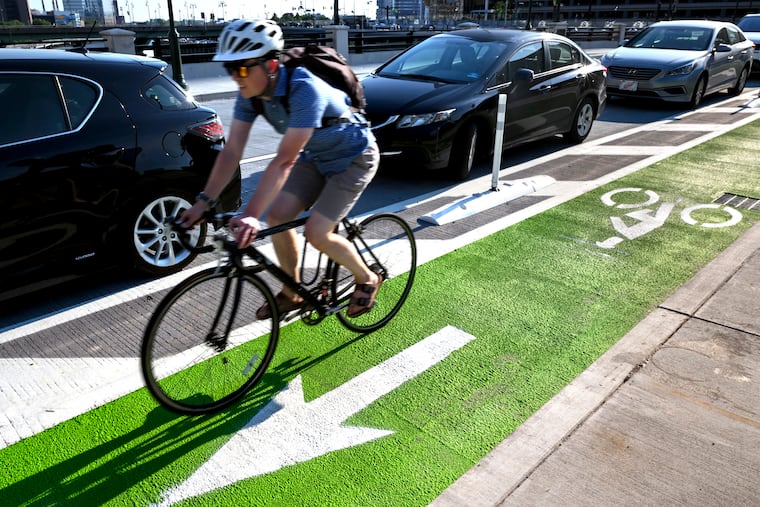Gov. Wolf vetoes a bill for protected bike lanes over move to limit Krasner’s authority
The legislation would have required the state to take over prosecutions for crimes on SEPTA.

Gov. Tom Wolf on Thursday vetoed long-sought legislation authorizing protected bike lanes because it contained an amendment that would have removed Philadelphia District Attorney Larry Krasner’s jurisdiction over crimes on transit.
The legislation “continues the General Assembly’s record of politicizing crime and supporting local control until they disagree with local policies,” Wolf said in his formal veto message.
Another amendment to the measure, pushed by Republican leaders who control the legislature, would allow separated bike lanes only if a city’s police were legally required to enforce every violation of the motor-vehicle code equally.
This language was aimed at Philadelphia and Pittsburgh, which have enacted laws that prohibit police from using minor violations as the only justification for traffic stops. Black residents are disproportionately pulled over by police.
Minor infractions such as an improperly affixed license plate or expired inspection sticker would still earn drivers a ticket if they are stopped for another reason, the cities’ ordinances state.
“It’s a terrible shame that a commonsense traffic safety measure that saves lives got taken off the table — again,” said Sarah Clark Stuart, executive director of the Bicycle Coalition of Greater Philadelphia, part of a statewide group pushing for the bike-lane law for five years. She praised Wolf’s veto.
Republicans who supported the amendments said that they were concerned about increases in violent crime in cities and on Philadelphia’s public transit and that they believe tougher enforcement is needed.
“We could not sit idly by. If there is something we can do to help, we have a duty to do it,” said State Sen. Wayne Langerholc Jr. (R., Cambria), chair of the Senate Transportation Committee when the amendments were introduced last summer. A former prosecutor, he said traffic stops are useful tools that can unmask more serious crimes.
» READ MORE: Reports of aggravated assault and robbery on SEPTA soared during the pandemic as ridership fell
Stuart said the measure could have prevented other cities interested in bike lanes, such as Lancaster and York, from going ahead.
SEPTA has seen an increase in violent crime in its transit system over the last year, particularly on the two subway lines. And the city at large is enduring record numbers of shootings and homicides.
Krasner, accused by legislators and others of lax prosecution of violent crime, was impeached Wednesday by the Pennsylvania House for “misbehavior in office.”
Officials at SEPTA, a state-created authority that serves Philadelphia and its four collar counties, have not responded to a request for comment.
Separated bike lanes, considered the safest option for riders, have historically been barred on state-owned roadways because an old Pennsylvania law requires parked vehicles to be within 12 inches of the curb, or the edge of the pavement.
The lanes, also referred to as “parking-protected,” are dedicated tracks for cyclists with a row of parked vehicles to shield them from being hit by cars and trucks. A marked 5-foot-wide lane abuts the curb and drivers park on the other side of a safety buffer — putting them up to eight feet from the curb, a violation of the Pennsylvania law.